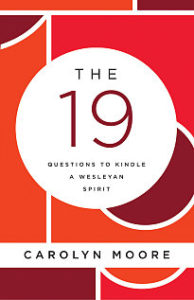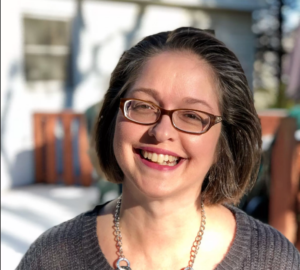(Following is an excerpt from The 19, published this year by Abingdon Press. The book addresses each of the nineteen questions asked of United Methodist ordinands since the days of John Wesley. This reflection is based on question #12: “Do you approve our Church government and polity?”)

Hannah Whitehall Smith says it is our nature to rebel against laws that are outside of us, but we embrace that which springs up from within. And it is true, isn’t it? We always like our own ideas better than other people’s ideas. God knows this about us, so his way of working in us is to get possession of us so he can make his ideas our ideas. This is why Paul could say with confidence, “Christ in you is the hope of glory” (Colossians 1:27, italics mine). Without the indwelling Christ, we are just another human being who knows the rules.
That difference between head-level rules and heart-level rules is the difference between life and death in ministry. Just as knowing the law but not owning it was death for the Israelites, so too it is death for us. We are designed for a “religion of the heart” (Wesley, Thoughts Upon Methodism). There is something to be said for signing on at the heart level, for embracing first our theology, then our polity, and allowing them to shape us from the inside out. We may not approve of every “jot and tittle,” but we can affirm the spirit of our tribe. In fact we should affirm this spirit, if we are going to be part of this connection.
Let’s be honest. No job is everything we love and nothing we don’t. Every job has its plusses and minuses. I didn’t come into United Methodist ministry because I fell in love with its discipline and polity. I came into the ministry because I love Jesus, and I sense that within the UMC’s system of connection and covenant I can serve him well. I complain with the best of them about Charge Conference and end-of-year reporting, but I manage to accomplish those tasks because they are part of a bigger ministry life I love dearly. I love healing prayer and preaching and the stunning miracle of seeing someone embrace Christ. I love seeing people get filled with the Holy Spirit. I love the countless hours spent listening and praying, and I love thinking strategically about how to extend this work as far as possible. At its best, United Methodist polity and discipline serves these other causes well. I am well aware that polity is not a matter of salvation, but I know that supporting and maintaining it is the only way our connection and covenant will function. If we all pick and choose which parts we like and which we don’t, it won’t work. Anarchy ensues.
Wesley’s practice of repetition in these [19] questions reveals his understanding of human nature. If I didn’t know better, I’d think he dealt often with ministers who were weak in the spiritual discipline of letting their yes be yes and their no be no. How much confusion is caused by well-meaning people who have not counted the cost before building the house, who have signed on without letting the spirit of our tribe sink into their bones? Can I say this with complete respect and love? You don’t get to decide what it means to be United Methodist. That has already been determined. Any decision to change that must go through proper channels, covered with massive amounts of prayer. Do you approve that? Can you approve the spirit of our discipline and polity while maintaining a generous heart?
Obviously, I made it out of seminary with a degree because here I am as a pastor. To my absolute surprise, I found myself back in school a few years ago completing a doctorate. In our first session together, my doctoral cohort tackled a ropes course. One of our challenges was a two-wire exercise. The wires, about three feet above ground, were stretched between two trees. As they traveled from one tree to the other, they gradually spread apart from each other. One person balanced on one wire and a partner balanced on the other wire. Our task was to lean into one another while we slowly scooted down the wires, even as they spread further and further apart. The trick was to lean equally on each other (remember that) as counter-weights to hold each other up. It won’t work if one leans and the other doesn’t, so we both had to lean in and surrender all our weight.
We discovered through trial and error that the best way for two people to scoot down the wire was to listen to each other. We would ask, “What do you need? What does this look like from your perspective? How can I help?” Without verbalizing it, it was hard to know the other person’s challenge in that moment. Our teammates on the ground were also there to tell us what we couldn’t see. They would say things like, “Straighten up! Push in!” And I’d think, “I AM pushing in!” when evidently I wasn’t. It was almost impossible when I was wobbling on that wire to know my own position. It took all of us working together to get two of us from one tree to the other.
The moral of the story, of course, is that we need each other. This is the point of our connectional system. It is designed for people who trust each other enough to lean in. But it only works if everyone leans in. It won’t work if one leans and another doesn’t. The key to the whole system is vulnerability. It is in keeping my heart soft toward the people God places in my path so that they become the priority rather than the institution. The clearest way I’ve seen to maintain vulnerability is to speak honestly out of my own experience — even my own brokenness. The guy who said, “One thing I do know, that though I was blind, now I see” got a mention in the most-read book of all time (John 9:25). The guy who said, “I believe; help my unbelief!” is my favorite unnamed person in the Bible (Mark 9:24). Both displayed the heart of flesh necessary for spiritual connection to happen.
As you make your own personal inventory of what you believe about our polity and discipline, ask yourself if you are sufficiently healed and whole to lean in — to give yourself wholeheartedly to a connection of Christ-followers who are bent on spreading “scriptural holiness over the land” (Wesley, Large Minutes). This is the great need. It is for people ready to partner in both covenant and connection for the sake of a lost and hurting world.








